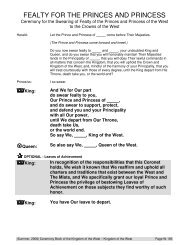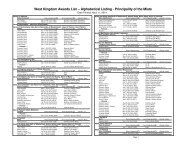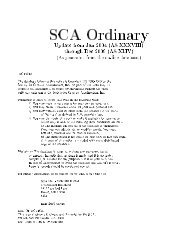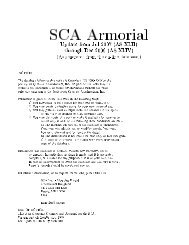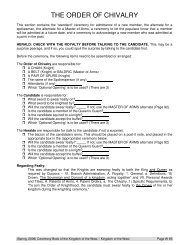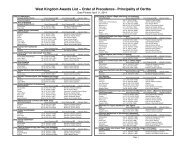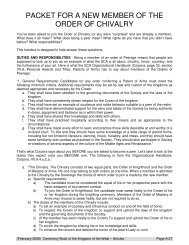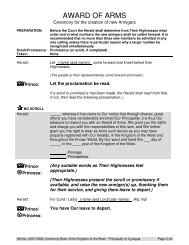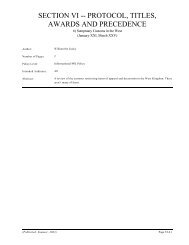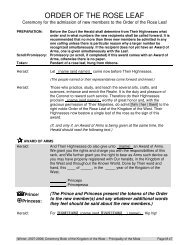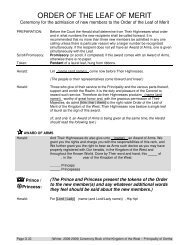Fealty, Loyalty and Obedience - West Kingdom College of Heralds ...
Fealty, Loyalty and Obedience - West Kingdom College of Heralds ...
Fealty, Loyalty and Obedience - West Kingdom College of Heralds ...
Create successful ePaper yourself
Turn your PDF publications into a flip-book with our unique Google optimized e-Paper software.
<strong>Fealty</strong>, <strong>Loyalty</strong> <strong>and</strong> <strong>Obedience</strong><br />
the last word. Every subject has the right -- <strong>and</strong> the duty<br />
-- to question the decisions <strong>of</strong> the Crown, if the subject<br />
feels that the decisions are not correct. However, the<br />
questions should be put at the appropriate time, <strong>and</strong> in<br />
the appropriate form. A question put at formal Court, <strong>and</strong><br />
phrased “Are you out <strong>of</strong> your mind, you ninny?” has<br />
much less chance <strong>of</strong> being answered than one asked<br />
privately, which begins “Your Majesty, have you<br />
considered the following points?” Further, the public<br />
question is bad theater as well as being rude, while the<br />
private question is both politic <strong>and</strong> polite.<br />
Further, even with those who are bound to him in fealty,<br />
the King does not have the right to dem<strong>and</strong> obedience in<br />
matters which are not within his lawful comm<strong>and</strong>. The<br />
exact phrase used in the <strong>West</strong>ern oaths is “to obey the<br />
lawful comm<strong>and</strong>s <strong>of</strong> the King”, <strong>and</strong> some matters lie<br />
beyond that bound. “We would like to use your pavilion<br />
to hold Court, as the Royal Pavilion has blown away” is<br />
very different from “My sister showed up unexpectedly<br />
<strong>and</strong> will be staying in your pavilion this weekend -- find<br />
another place to sleep.” The first is a comm<strong>and</strong> phrased as<br />
a request, <strong>and</strong> is something needful for the <strong>Kingdom</strong>, <strong>and</strong><br />
it should be accommodated if at all possible; the second<br />
is a bald comm<strong>and</strong> upon an unlawful issue. It would<br />
provoke resistance for the first error, <strong>and</strong> deserve it for the<br />
second.<br />
<strong>West</strong> <strong>Kingdom</strong> Herald’s H<strong>and</strong>book<br />
In his Coronation Oath, each King promises “to uphold<br />
the Law <strong>of</strong> the <strong>Kingdom</strong>”. This “Law” includes both the<br />
written law <strong>of</strong> the <strong>Kingdom</strong> <strong>and</strong> the body <strong>of</strong> custom <strong>and</strong><br />
tradition on which it rests, <strong>and</strong> it is this “Law” which bars<br />
the King from making unlawful comm<strong>and</strong>s. Further, in the<br />
same Oath, the King swears “to speak <strong>and</strong> to be silent”.<br />
The first part <strong>of</strong> this phrase refers to the King’s duty to<br />
is sue such comm<strong>and</strong>s as are needful, but the second<br />
binds him to listen to the counsel <strong>of</strong>fered him.<br />
CONCLUSION<br />
In all these matters, there is a necessity to balance <strong>and</strong><br />
match the needs <strong>and</strong> dem<strong>and</strong>s <strong>of</strong> the parties on both<br />
sides. Both overlord <strong>and</strong> vassal must consider the abilities<br />
<strong>of</strong> their partners, <strong>and</strong> must not dem<strong>and</strong> that which cannot<br />
be given. This is simple courtesy, which is the bedrock <strong>of</strong><br />
our Society <strong>and</strong> should govern all our actions.<br />
(This article was originally written for Cockatrice, <strong>and</strong> was<br />
published in Edition 4 & 5, Autumn XX.)<br />
Page XIII.1.6 (Published: Summer, 2002)



